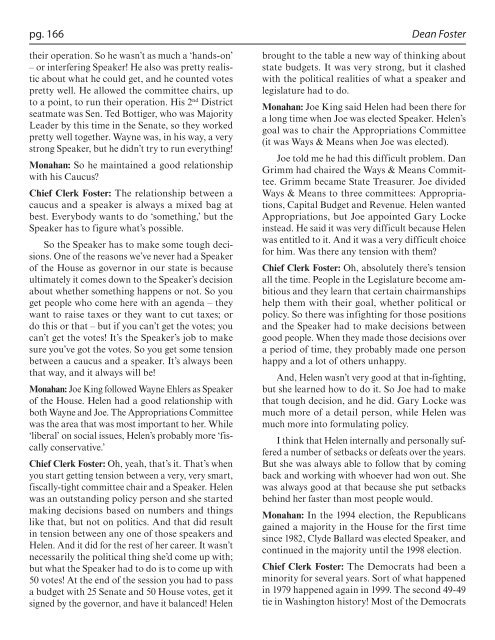Helen Sommers: An Oral History
Helen Sommers: An Oral History
Helen Sommers: An Oral History
Create successful ePaper yourself
Turn your PDF publications into a flip-book with our unique Google optimized e-Paper software.
pg. 166 Dean Foster<br />
their operation. So he wasn’t as much a ‘hands-on’<br />
– or interfering Speaker! He also was pretty realistic<br />
about what he could get, and he counted votes<br />
pretty well. He allowed the committee chairs, up<br />
to a point, to run their operation. His 2 nd District<br />
seatmate was Sen. Ted Bottiger, who was Majority<br />
Leader by this time in the Senate, so they worked<br />
pretty well together. Wayne was, in his way, a very<br />
strong Speaker, but he didn’t try to run everything!<br />
Monahan: So he maintained a good relationship<br />
with his Caucus?<br />
Chief Clerk Foster: The relationship between a<br />
caucus and a speaker is always a mixed bag at<br />
best. Everybody wants to do ‘something,’ but the<br />
Speaker has to figure what’s possible.<br />
So the Speaker has to make some tough decisions.<br />
One of the reasons we’ve never had a Speaker<br />
of the House as governor in our state is because<br />
ultimately it comes down to the Speaker’s decision<br />
about whether something happens or not. So you<br />
get people who come here with an agenda – they<br />
want to raise taxes or they want to cut taxes; or<br />
do this or that – but if you can’t get the votes; you<br />
can’t get the votes! It’s the Speaker’s job to make<br />
sure you’ve got the votes. So you get some tension<br />
between a caucus and a speaker. It’s always been<br />
that way, and it always will be!<br />
Monahan: Joe King followed Wayne Ehlers as Speaker<br />
of the House. <strong>Helen</strong> had a good relationship with<br />
both Wayne and Joe. The Appropriations Committee<br />
was the area that was most important to her. While<br />
‘liberal’ on social issues, <strong>Helen</strong>’s probably more ‘fiscally<br />
conservative.’<br />
Chief Clerk Foster: Oh, yeah, that’s it. That’s when<br />
you start getting tension between a very, very smart,<br />
fiscally-tight committee chair and a Speaker. <strong>Helen</strong><br />
was an outstanding policy person and she started<br />
making decisions based on numbers and things<br />
like that, but not on politics. <strong>An</strong>d that did result<br />
in tension between any one of those speakers and<br />
<strong>Helen</strong>. <strong>An</strong>d it did for the rest of her career. It wasn’t<br />
necessarily the political thing she’d come up with;<br />
but what the Speaker had to do is to come up with<br />
50 votes! At the end of the session you had to pass<br />
a budget with 25 Senate and 50 House votes, get it<br />
signed by the governor, and have it balanced! <strong>Helen</strong><br />
brought to the table a new way of thinking about<br />
state budgets. It was very strong, but it clashed<br />
with the political realities of what a speaker and<br />
legislature had to do.<br />
Monahan: Joe King said <strong>Helen</strong> had been there for<br />
a long time when Joe was elected Speaker. <strong>Helen</strong>’s<br />
goal was to chair the Appropriations Committee<br />
(it was Ways & Means when Joe was elected).<br />
Joe told me he had this difficult problem. Dan<br />
Grimm had chaired the Ways & Means Committee.<br />
Grimm became State Treasurer. Joe divided<br />
Ways & Means to three committees: Appropriations,<br />
Capital Budget and Revenue. <strong>Helen</strong> wanted<br />
Appropriations, but Joe appointed Gary Locke<br />
instead. He said it was very difficult because <strong>Helen</strong><br />
was entitled to it. <strong>An</strong>d it was a very difficult choice<br />
for him. Was there any tension with them?<br />
Chief Clerk Foster: Oh, absolutely there’s tension<br />
all the time. People in the Legislature become ambitious<br />
and they learn that certain chairmanships<br />
help them with their goal, whether political or<br />
policy. So there was infighting for those positions<br />
and the Speaker had to make decisions between<br />
good people. When they made those decisions over<br />
a period of time, they probably made one person<br />
happy and a lot of others unhappy.<br />
<strong>An</strong>d, <strong>Helen</strong> wasn’t very good at that in-fighting,<br />
but she learned how to do it. So Joe had to make<br />
that tough decision, and he did. Gary Locke was<br />
much more of a detail person, while <strong>Helen</strong> was<br />
much more into formulating policy.<br />
I think that <strong>Helen</strong> internally and personally suffered<br />
a number of setbacks or defeats over the years.<br />
But she was always able to follow that by coming<br />
back and working with whoever had won out. She<br />
was always good at that because she put setbacks<br />
behind her faster than most people would.<br />
Monahan: In the 1994 election, the Republicans<br />
gained a majority in the House for the first time<br />
since 1982, Clyde Ballard was elected Speaker, and<br />
continued in the majority until the 1998 election.<br />
Chief Clerk Foster: The Democrats had been a<br />
minority for several years. Sort of what happened<br />
in 1979 happened again in 1999. The second 49-49<br />
tie in Washington history! Most of the Democrats
















